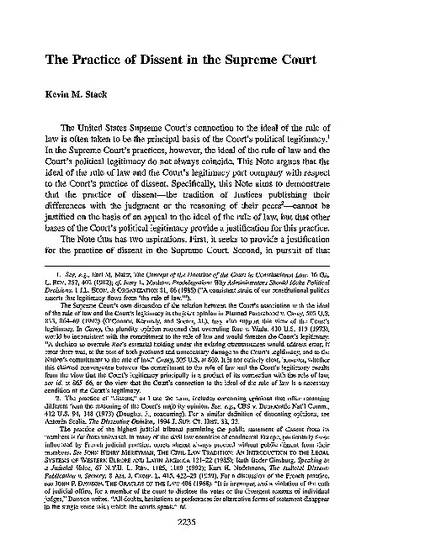
- rule of law,
- practice of dissent,
- legitimacy
The United States Supreme Court's connection to the ideal of the rule of law is often taken to be the principal basis of the Court's political legitimacy. In the Supreme Court's practices, however, the ideal of the rule of law and the Court's political legitimacy do not always coincide. This Note argues that the ideal of the rule of law and the Court's legitimacy part company with respect to the Court's practice of dissent. Specifically, this Note aims to demonstrate that the practice of dissent-the tradition of Justices publishing their differences with the judgment or the reasoning of their peers--cannot be justified on the basis of an appeal to the ideal of the rule of law, but that other bases of the Court's political legitimacy provide a justification for this practice. The Note thus has two aspirations. First, it seeks to provide a justification for the practice of dissent in the Supreme Court. Second, in pursuit of that justification, it strives to make a more general point about the relation between the rule of law and the Court's legitimacy. If the ideal of the rule of law cannot justify an element of the Court's practice that contributes to its legitimacy, then that legitimacy must be more than a product of the Court's connection to the rule of law. Part I attempts to show that the ideal of the rule of law cannot justify the practice of dissent. It examines two approaches to establishing a principled connection between the Supreme Court and the ideal of the rule of law, and argues that they both fail to account for the practice of dissent. Part II presents a justification for the practice of dissent through consideration of the constitutional commitment to the ideal of deliberative democracy. The basic argument is that the Supreme Court's legitimacy depends in part upon the Court reaching its judgments through a deliberative process, just as Congress's legitimacy depends in part on its members enacting legislation through such a process. Given the secrecy of the Court during the formation of its judgments, the practice of dissent is necessary to manifest the deliberative character of the process through which the Court reaches its decisions.
Available at: http://works.bepress.com/kevin-stack/4/
